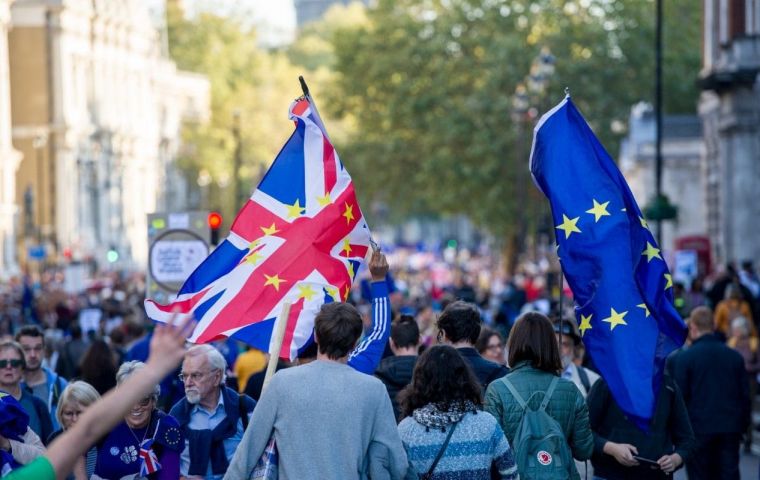MercoPress. South Atlantic News Agency
A no Brexit deal will slow sharply UK economic growth, says think tank
 Expectations of a boost for public spending in next week’s Budget have been fuelled by PM Theresa May’s recent declaration that the end of austerity is in sight
Expectations of a boost for public spending in next week’s Budget have been fuelled by PM Theresa May’s recent declaration that the end of austerity is in sight  This would give Chancellor Hammond space to borrow an average of £16 billion a year more between 2019/20 and 2022/23 than was expected in the spring
This would give Chancellor Hammond space to borrow an average of £16 billion a year more between 2019/20 and 2022/23 than was expected in the spring A no-deal Brexit could slam the brakes on the UK’s economic growth, wiping out Chancellor Philip Hammond’s hopes of boosting public spending, a think tank has said. If the UK fails to reach a withdrawal deal with the EU and moves on to World Trade Organization (WTO) rules next March, GDP growth can be expected to slow sharply from 1.4% this year to 0.3% in both 2019 and 2020, said the National Institute of Economic and Social Research (Niesr).
This scenario, which assumes that the shift to WTO rules is achieved in an orderly way, would erode almost all of the space available for Mr Hammond to increase spending on services.
Expectations of a boost for public spending in next week’s Budget have been fuelled by Prime Minister Theresa May’s recent declaration that the end of austerity is in sight. By contrast, Niesr forecast that a “soft” Brexit with a deal with Brussels could see growth rise to 1.9% in 2019 and 1.6% in 2020.
This would give Mr Hammond space to borrow an average of £16 billion a year more between 2019/20 and 2022/23 than was expected in the spring.
“This provides room for the Chancellor to spend an average of around £30 billion more over the same period,” said Niesr. “Under the no-deal Brexit scenario almost all of this additional fiscal space will be eroded.”
The soft Brexit scenario would allow Mr Hammond to meet his fiscal targets of getting the deficit below 2% of GDP by 2020/21 and seeing debt falling as a proportion of GDP over the same period, while making additional borrowing, said Niesr.
But the think tank added: “All this is not to suggest that a soft Brexit will offer the Chancellor a free rein on spending – it will not. Even under that optimistic scenario, the Chancellor will fail to comply with the fiscal objective which is to achieve overall fiscal balance over the medium term”.




Top Comments
Disclaimer & comment rulesCommenting for this story is now closed.
If you have a Facebook account, become a fan and comment on our Facebook Page!